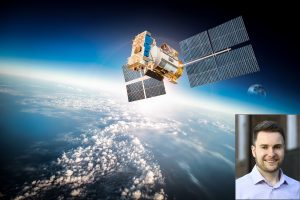
Supported by a Space@Hopkins seed grant, Jochen Mueller, Assistant Professor in the Department of Civil and Systems Engineering (CaSE), is leading a team that aims to develop a space actuator using modern manufacturing techniques.
Established in 2016, the Space@Hopkins Seed Grant program distributes grants of up to $25,000 a year to support researchers developing new space-related ideas that enhance their ability to obtain external funding for civilian space research.
The team’s project is titled “Dielectric Metamaterial Actuators as Highly Efficient and Endurable Actuators in Space Applications.”
Actuators are components of a system responsible for converting energy into mechanical force and are used in a variety of applications in space exploration, ranging from steering spacecraft to positioning solar sails and orienting satellites and telescopes. However, actuators often require complex mechatronic assemblies, which have drawbacks that include regular maintenance and generating undesired micro-vibrations.
According to Mueller, the use of dielectric elastomer actuators, or DEAs, offers a potential solution. DEAs consist of a soft, rubber-like material coupled with electrodes. By applying a voltage between the electrodes, the actuator can change configuration. Unfortunately, there are disadvantages to DEAs in certain contexts—for example, they require complex, manual assembly and only transmit limited force while pushing instead of pulling. Mueller’s team will develop novel additive fabrication techniques, also known as 3D printing, that can overcome these challenges, to make DEAs suitable for space applications.
“By overcoming these limitations, DEAs would be elevated from niche applications to mission-critical levels, enabling cheaper, more reliable, and durable actuators for space activities, such as human spaceflight, planetary exploration, and earth observation,” Mueller said.
Mueller’s work is part of an increasing trend of space-related research by CaSE faculty, who have led other research projects supported by the Space@Hopkins program in recent years, including Professor James Guest—for research on generating new structural concepts that leverage new materials and manufacturing technologies—and Assistant Professor Stavros Gaitanaros—for a project that seeks to understand the mechanics of cellular materials under extreme conditions with a goal of developing lightweight, multi-functional materials.
Faculty members have also recently received grants through NASA’s Space Technology Research Institute (STRI), Early Stage Innovations (ESI), and Transformational Tools and Technology (TTT) programs, while graduate students have received the NASA Space Technology Graduate Research Opportunities (NSTGRO). Faculty and graduate students have also been recognized with NASA Group Achievement Awards in 2017 and 2023.
“The research by these faculty members and graduate students in the above-mentioned NASA programs have played a key role in advancing space research, aligning with CaSE’s commitment to address the grand societal challenge of space exploration and habitation,” said Guest.